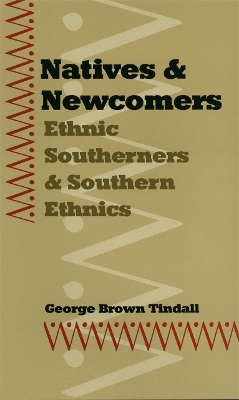Georgia Southern University Jack N. and Addie D. Averitt Lecture
1 total work
In Natives and Newcomers, George Brown Tindall surveys the changes in the South's cultural and racial makeup over the past two centuries. Tindall discusses southern ethnicity in light of immigration laws and trends, attitudes toward immigrants, and economic and political forces that have changed the region's ethnic makeup from within (such as the Civil War) or without (such as Castro's rise to power in Cuba).
Tindall shows that the colonial South developed the most polyglot population in the English colonies, encompassing Indian tribes, Western Europeans, and West Africans. The southern and western rims of the South, moreover, were adjoined by Spanish and French colonies into the nineteenth century. After the American Revolution, fewer immigrants came south, Indians were largely expelled, the slave trade subsided--and southerners of whatever color came to be almost wholly native-born. A single group of ethnic southerners with white and black subgroups emerged--subgroups that had more in common, Tindall observes, than they cared always to admit.
After World War II a trend toward greater diversity reemerged when newcomers from abroad (primarily Hispanic, Caribbean, and Asian people) and from other regions in the United States began entering the South in greater proportions than at any other time since the colonial period. Immigrants living in the South now account for 23.2 percent of the total United States immigrant population, Tindall points out.
"Now, just over two hundred years after the birth of the Cotton Belt and one hundred years after the birth of the New South," he concludes, "the conviction grows that the region is at a new conjuncture in its history. One thing seems already clear about the post-New South. The shades of the Sunbelt will no longer be a simple matter of black and white. They will span a much broader spectrum of color."
